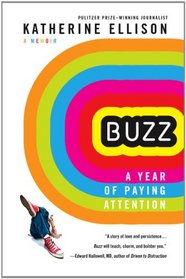I read this book thinking the focus would be on how the author focused on understanding her son with ADHD. What I found, however, was that the author really focused on herself, her own ADD diagnosis, and how she felt about HER ADD diagnosis. I found that how she felt about her son's diagnosis to be secondary to her concerns about herself.
I felt that the author was somewhat of a helicopter Mom--even going so far as to sign up her teenage son up for a summer camp that the Moms also attended. I found it a bit off-putting that she framed everything about her son's behavior and diagnosis in the context of how it related to HER. Take the following excerpt from page 215 for example:
"I recognize the heightened risk that Buzz could die ignobly, as the result of some impulsive move--like so many I've made myself--in which case, for the rest of my life, I'll be a bad parent. Or he could die at the end of a brilliant life, in which case I'll be a genius."
It's not really about Buzz. It's all about Katherine Ellison.
I did like the parts where the author bared her heart and discussed how she truly felt dealing with her son's behavior and diagnosis, as well as it's effects on the rest of the family. I thought her passages where she debates the different therapies and their costs to be particularly heart-wrenching and enlightening. Unfortunately, however, too many times I felt that the author reverted to her own diagnosis and used her own ADD diagnosis to try to explain why parenting a child with ADD was so difficult.
I think parents of children with ADD might find some benefit in reading this book. The book held my interest, however I was disappointed in the "all about Mom" vibe.
I felt that the author was somewhat of a helicopter Mom--even going so far as to sign up her teenage son up for a summer camp that the Moms also attended. I found it a bit off-putting that she framed everything about her son's behavior and diagnosis in the context of how it related to HER. Take the following excerpt from page 215 for example:
"I recognize the heightened risk that Buzz could die ignobly, as the result of some impulsive move--like so many I've made myself--in which case, for the rest of my life, I'll be a bad parent. Or he could die at the end of a brilliant life, in which case I'll be a genius."
It's not really about Buzz. It's all about Katherine Ellison.
I did like the parts where the author bared her heart and discussed how she truly felt dealing with her son's behavior and diagnosis, as well as it's effects on the rest of the family. I thought her passages where she debates the different therapies and their costs to be particularly heart-wrenching and enlightening. Unfortunately, however, too many times I felt that the author reverted to her own diagnosis and used her own ADD diagnosis to try to explain why parenting a child with ADD was so difficult.
I think parents of children with ADD might find some benefit in reading this book. The book held my interest, however I was disappointed in the "all about Mom" vibe.




